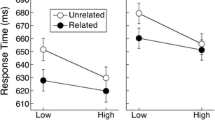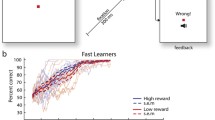Abstract
A number of prominent writers have suggested that in light of recent anomalous findings we greatly modify or abandon entirely the traditional “paradigms and laws” of learning. The data to which they refer are troublesome only to very simple-minded and literal interpretations of traditional paradigms, such as appear in typical textbook treatments. Current interpretations of the reinforcement paradigm can easily include such “anomalous” data. Once we recognize that reinforcers may never be considered independently of behaviors to be reinforced and conditions under which specific effects are viewed, these and other problems diminish in importance. As a means for advancing our understanding of behavior, the paradigms and laws of learning are better viewed as approximations, rather than as inviolate laws.
Similar content being viewed by others
References
v. BEKESY, G. V. 1967. Sensory inhibition. Princeton: Princeton University Press.
BOLLES, R. C. 1970. Species-specific defense reactions and avoidance learning. Psychological Review, 77, 32–48.
BOLLES, R. C. 1972. Reinforcement, expectancy, and learning. Psychological Review, 79, 394–409.
BRELAND, K., & BRELAND, M. 1961. The misbehavior of organisms. American Psychologist, 16, 681–684.
BROWN, P. L., & JENKINS, H. M. 1968. Auto-shaping of the pigeon’s keypeck. Journal of the Experimental Analysis of Behavior, 11, 1–8.
FALK, J. L. 1969. Conditions producing psychogenic polydipsia in animals. Annals of the New York Academy of Sciences, 157, 569–593.
FANTINO, E. J., SHARP, D., & COLE, M. 1966. Factors facilitating lever-press avoidance. Journal of Comparative and Physiological Psychology, 62, 214–217.
GARCIA, J., ERVIN, F. R., & KOELLING, R. A. 1966. Learning with prolonged delay of reinforcement. Psychonomic Science, 5, 121–122.
HILGARD, E.R., & BOWER, G.H. 1975. Theories of learning. Englewood Cliffs: Prentice-Hall. Pp. 561–566.
HOFFMAN, H. S., & FLESHLER, M. 1959. Aversive control with the pigeon. Journal of the Experimental Analysis of Behavior, 2, 213–218.
HULL, C. L. 1929. A functional interpretation of the conditioned reflex. Psychological Review, 36, 498–511.
HULL, C. L. 1930. Knowledge and purpose as habit mechanisms. Psychological Review, 37, 511–525.
MALONE, J. C., Jr. 1973. A note on general process learning theorists. Psychological Review, 80, 305.
MALONE, J. C., Jr. 1975a. William James and B. F. Skinner: Behaviorism, reinforcement, and interest. Behaviorism. (In press.)
MALONE, J. C., Jr. 1975b. Stimulus-specific contrast effects during operant discrimination learning. Journal of the Experimental Analysis of Behavior. (In press.)
MALONE, J. C., Jr., & STADDON, J. E. R. 1973. Contrast effects in maintained generalization gradients. Journal of the Experimental Analysis of Behavior, 19, 167–179.
MILLER, N. E. 1963. Some reflections on the law of effect produce a new alternative to drive reduction. In M. R. Jones (Ed.), Nebraska symposium on motivation. Lincoln: University of Nebraska Press. Pp. 65–112.
PAVLOV, I. P. 1927. Conditioned reflexes (Tr. G. V. Anrep) London: Oxford University Press.
PAVLOV, I. P. 1928. Lectures on conditioned reflexes (Tr. W. H. Gantt) New York: International.
PREMACK, D. 1959. Toward empirical behavior laws: I. Positive reinforcement. Psychological Review, 66, 219–233.
PREMACK, D. 1969. Catching up with common sense or Iwo sides of a generalization: Reinforcement and punishment. Paper read at the Conference on the Nature of Reinforcement, Center for Research in Human Learning, University of Pittsburgh, June, 1969.
SELIGMAN, M. E. P. 1970. On the generality of the laws of learning. Psychological Review, 77, 406–418.
SKINNER, B. F. 1938. The behavior of organisms. New York: Appleton.
SKINNER, B. F. 1948. Walden II. New York: Macmillan.
SKINNER, B. F. 1953. Science and human behavior. New York: Macmillan.
SKINNER, B. F. 1964. Behaviorism at fifty. In W. T. Wann (Ed.), Behaviorism and phenomenology. Chicago: University of Chicago Press. Pp. 79–108.
SKINNER, B. F. 1966. The phylogeny and ontogeny of behavior. Science, 153, 1205–1213.
SKINNER, B. F. 1971. Beyond freedom and dignity. New York: Knopf.
SMITH, K. 1974. The continuum of reinforcement and attenuation. Behaviorism, 2, 124–145.
SOLOMON, R. L., KAMIN, L. J., & WYNNE, L. C. 1953. Traumatic avoidance learning: The outcomes of several extinction procedures with dogs. Journal of Abnormal and Social Psychology, 48, 291–302.
THORNDIKE, E. L. 1898. Animal intelligence: An experimental study of the associative processes in animals. Psychological Review (Monograph Supplement), 2 (8).
THORNDIKE, E. L. 1913. The original nature of man. In Educational psychology. Vol. II. New York: Teachers College, Columbia University. Pp. 123–125.
TOLMAN, E. C. 1948. Cognitive maps in rats and men. Psychological Review, 55, 189–208.
ZIMMERMAN, J. 1959. Sustained performance in rats based on secondary reinforcement. Journal of Comparative and Physiological Psychology, 22, 353–358.
Author information
Authors and Affiliations
Additional information
Preparation of this manuscript was supported by Grant No. MH-24997 from the National Institute of Mental Health, USPHS. I thank W. S. Verplanck and W. H. Calhoun for their comments and criticisms of an earlier version of this paper.
Rights and permissions
About this article
Cite this article
Malone, J.C. The “Paradigms” of Learning. Psychol Rec 25, 479–489 (1975). https://doi.org/10.1007/BF03394340
Published:
Issue Date:
DOI: https://doi.org/10.1007/BF03394340




